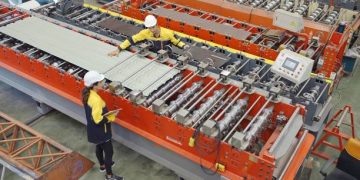A recent report from the Manufacturing Technologies Association (MTA) underscores the substantial impact of the manufacturing sector on the UK economy, challenging common misconceptions about its relevance and vitality. According to the “True Impact of Manufacturing Report,” the sector employed approximately 2.6 million people and contributed £184 billion to the UK’s gross value added (GVA) in 2022. The report reveals that manufacturing is not a uniform sector; its various sub-sectors contribute differently to the economy. For instance, food product manufacturing is the largest sub-sector, accounting for 13% of the manufacturing GVA and 17% of employment, likely due to its perishable products and local consumption patterns. In contrast, sectors such as textiles and leather have seen a decrease in domestic output, possibly due to competitive production opportunities abroad.
The report also highlights regional disparities in the economic impact of manufacturing. Wales, for example, sees manufacturing account for 16% of its GVA, significantly higher than London’s 2%. Places like Wrexham and Flintshire see even greater reliance on manufacturing for employment. Manufacturing not only provides above-average wages, which exceed the UK median by 11%, but also drives innovation and productivity. The sector accounted for 47% of business research and development investment in the UK, fueling advancements that contribute to global competitiveness. Notably, manufacturing is heavily oriented towards exports, comprising over a third of the UK’s goods and services exports. The productivity of the manufacturing sector is particularly notable, with an average GVA per job of £75,000—33% above the overall economy’s average. This productivity has been increasing steadily, with the manufacturing GVA per job growing by 1.2% annually from 2016 to 2022, compared to a 0.5% growth rate in the broader economy.
The sector’s broader economic impact is also significant, supporting £348 billion of GDP and five million jobs in 2022 when considering the indirect and induced impacts from supply chains servicing the industry. In total, the manufacturing sector’s impact on UK GDP was estimated at £518 billion for the year 2022. Recognizing the importance of this sector, the UK Government has launched a £4.5 billion Advanced Manufacturing Plan to promote innovation and support dynamic sectors within the industry. However, there is concern that Welsh Government and sector bodies such as Industry Wales are not fully capitalizing on this initiative, despite Wales being one of the most manufacturing-intensive areas in the UK. Critics argue that more targeted efforts are needed to ensure Wales receives an equitable share of funding, potentially amounting to £720 million, to enhance the competitiveness of its manufacturing sector and improve the overall productivity of the Welsh economy.
Discover in-depth supply chain report news insights at The Supply Chain Report. For international trade tools, see ADAMftd.com.
#ManufacturingNews #WelshEconomyNews #UKGovernment #SupplyChainNews #InnovationNews















